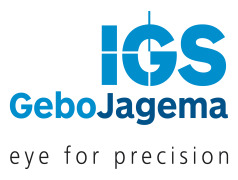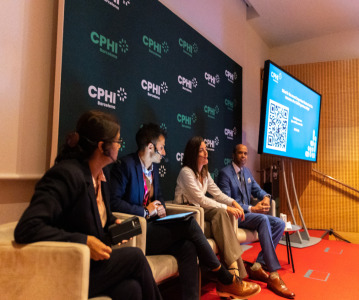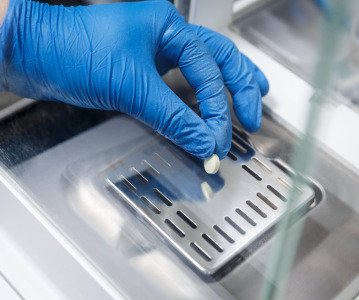Moulds & Tooling: A European success story

While not quite an endangered species, the past fifteen years have not been easy ones for many European mould makers. Many, but not all, and IGS GeboJagema is a case in point – a case that shows the difference automation and focus can make. By Karen Laird.
While the name may seem somewhat complex, it ensures people don’t forget us,” says Sales Director at IGS GeboJagema, Hans Arts. “It’s complicated – but that’s exactly what we do,” he added. The name derives from an amalgamated history: in the past, the two mould makers IGS and GeboJagema, which latter was also the product of an earlier merge, became IGS GeboJagema.
In 2011, the mould maker purchased HTP Tooling, another toolmaker, located in Eindhoven. IGS GeboJagema – originally located in Tilburg (NL) – relocated to Eindhoven and, in the words of Hans Arts, has ‘never looked back’. Up to then, although both HTP and IGS GeboJagema were active in numerous areas, each had, next to a number of less-than-successful activities, an area in which they excelled. In the case of IGS, this was moulds for the healthcare sector, while HTP’s specialty was building tools for optical applications. The strategic decision to shed all activities not directly related to these two core competencies, and to go forward as a specialist in healthcare and optics proved to be a prescient one: despite a ferocious economic recession, during which many mould makers foundered or switched directions, becoming die makers or manufacturing precision parts, IGS GeboJagema showed an incredible pace of growth. In the past seven years, the company has seen its turnover soar from €10m to
€30m+, with over 90% of its mould headed for customers abroad. Only 10% of our market is here in the Netherlands, said Arts, and that percentage is shrinking.
Market focus
Innovative power and the stringent adherence to these two areas of expertise are part of what are behind the company’s success, says Hans Arts. “In 2011, a month after relocating to Eindhoven, we were granted our first order from one of the leading pharmaceutical companies in the world. The moulds were for a complex dry powder inhaler – complex, because it was for a dual blister device that delivered a combination product that – in the device – was separately formulated into single mono therapy blisters. It was a new development in the area of device delivery systems. “Since successfully engineering and building that mould, orders from one after the other pharmaceutical company have followed.Insulin pens, metered dose inhalers and other drug delivery systems to in vitro diagnostics devices, Arts estimates that IGS GeboJagema serve, indirectly or directly, between 85% and 90% of OEMs in the pharmaceutical industry. “Pharmaceutical customers are in it for the long term,” Arts said. The cost to develop and market a new product is extraordinarily high, and the development process can take up to 15 years. “These companies take great care when selecting a toolmaker and look for someone who can do more than provide a mould. They are looking for a longterm partner with in-house capabilities to handle the entire project, from design to mould validation. The moulds we build tend to be costly – complex, multi-cavity hotrunner moulds with extremely tight tolerances. We ensure that when the mould leaves our premises it is ready for production.”
Working for the medical device industry also means that full and detailed traceability is essential, in connection with liability issues. “To that end, we document and report the entire production process, from the materials entering the plant, the machines, components, even the operators, in order to be able to track and identify each and every part produced”.
In the optics area, the company produces tools for sensors, glasses, contact lenses, ophthalmic devices - e.g. smart lenses – advanced solar panels and more. According to Arts, augmented reality is poised to become the next ‘big thing’ in this area. Over the years, the company has developed an expertise in optics application that is virtually unmatched in the world. Growth is by word of mouth, says Arts – ‘no marketing required’.
Everything is done here in Eindhoven, the company’s only location. Meanwhile, IGS GeboJagema is also tentatively moving into a third focus area: High performance packaging, which they see as a logical extension of the current activities.
Automation and optimisation
Arriving at this level of recognition in the industry is the result of a proven track record in the company’s areas of expertise, achieved by a steady programme of investment in automation and professionalisation. IGS GeboJagema has gone from being a company that makes moulds to a full-service solutions provider. “Everything that can be automated has been automated,” says Hans Arts. “We are a paperless company.”One example is the model-based definition approach used by the six engineers employed by the company, which allows them to place the product manufacturing information directly into the 3D model, eliminating the need for 2D documentation and enhances the information flow.
The driving force behind the development towards fully automated ‘lights-out’ production is Peter Mertens, CEO at IGS GeboJagema. Mertens, who himself started out in the workshop, knows everything there is to know about mould making. He realised early on that the one way to stay competitive in this market, especially with the ever-growing problem of labour shortage, was to provide top quality, high precision moulds in the most efficient way possible – and that meant equipping the company with the most sophisticated technologies and machines available, all of which were chosen by him personally.
As a result, the number of processing operations – milling, grinding, EDM, etc. – has been substantially reduced, says Hans Arts: replaced by advanced CNC machines able to handle it all. “Moreover, each of these machines has been equipped with a robotic system, for instance a Turn-Assist station from RoboJob, instead of the manual loading system we were used to. Automating the loading and unloading of the CNC machines has doubled the number of operating hours a week.”
And last year, IGS GeboJagema also became the first company in Europe to install a 5-axis Makino D200Z high-speed milling cell in Europe, with the latest high-speed servo technology and an integrated robot. The new Makino is another step up from the 3-axis machines to Industry 4.0 standards, offering more speed, precision and flexibility. Another three 5-axis cells, complete with robots, will be added over the course of this year.
The company is specialised in complex multi-cavity moulds, where repeatability is extremely important. “Precision at the micron level,” Arts points out. “We can’t have differences between mould cavities, as the interchangeability of the products is essential when it comes to assembly of the mould.”
Automation has made it possible for the company to achieve the level of repeatability necessary, while keeping its prices at an acceptable level. “Unmanned production also means that, next to increasing our precision, we have also increased our efficiency: we’ve tripled our turnover, but the number of mould technicians has remained the same – we still employ the same number as we did back in 2011.”
Because of the company’s highly sophisticated machine park, he added, the tool parts no longer needed further
work when they came out of the machine but were ready for assembly.
IGS GeboJagema is now also moving beyond automation alone, towards the more digitalised environment of Industry 4.0. “The system ensures that the latest version of the project is the only one available – revisions are always up to date. This eliminates the possibility of errors.” Arts said. “Also, the new Makino is controlled by the ERP system.” As a result, the operator can no longer affect the output of the machine; the system is responsible for the planning and determine the priority of the tasks to be done. It is a development that will only increase in the future, as more and more machines will be connected, to create a ‘smart’ production setting.
Production-ready mould validation
IGS GeboJagema is extremely proud of its very rigorous mould validation procedures, and justly so. “Our knowledge in this area equals or sometimes even surpasses that of our customers. We have customers with extremely stringent requirements in this area. At least one looked at its own processes, and then opted to use ours. Mould validation here goes far beyond what is usually offered – it’s an important part of what sets us apart, and the reason why many customers choose to work with us,” Arts explains. The company has developed a scientific moulding approach to the validation process, involving determining the correct settings and the process window to achieve the product quality required. All critical measurements are checked in the metrology lab equipped with advanced technology, including a laser interferometer – a piece of equipment found in no other tooling manufacturer in the world.IGS GeboJagema also has its own range of injection moulding machines, including a number of fast-cycling electric presses, mainly for the optical moulds – on which the moulds are tested along with hot-runner controllers, chillers, coolers, resin drying and master batch colouring equipment. The services include initial dry cycles of tool, process definition, Design of Experiments, FOT, component inspection reports, initial batch runs, explained Arts. “We can perform everything through the Factory Acceptance Test of the moulds either on one of our own injection moulding machines or on the customer’s machine, on which the product will be moulded. In that case, it can be temporarily installed in one of the available validation cells. The only thing the customer needs to do is the performance qualification – the PQ.”
Continued growth
The rapid growth of the past seven years shows no signs of slackening. The company changed hands a few yearsago the previous owner was a local investor, Vado Beheer B.V. who sold it to Nordian Capital as of January 1, 2016. IGS GeboJagema has continued to prosper under the new ownership and is currently in the throes of an expansion project that will see, next to the redesign of the office areas, the addition of a completely new Customer Service Centre, where more than 20 injection moulding machines will be housed. This will not only free up much-needed space in the production area, it will make tool trials easier to carry out, as the machines will be installed in the new Centre ready to be hooked up for use. The new office space is needed to accommodate the recent growth in staff: next to a number of technical people, a new business development manager was recently hired, among others, to increase the company’s footprint in the packaging industry.
As the company adds high performance packaging to its areas of expertise, IGS GeboJagema can look forward to seeing the amount of work continuing to increase. With the company’s advanced level of automation and ongoing process of digitalization, it is confident that even in today’s tough competitive environment and despite the dearth of skilled employees in the market, as one of the leading mould makers in Europe it will continue to be able to more than meet the demands of its customers and to deliver the level of quality on which these customers depend.

Related News
-
News Women in Pharma: Our hopes for 2025 and beyond
Our last instalment for 2024 of the Women in Pharma series brings you messages direct from the Informa Markets CPHI team as they discuss the advice and insights they have carried throughout their roles working at CPHI, and what they hope to see for the... -
News CPHI Milan 2024 - From the Floor
Milan and CPHI welcome you to 2024 CPHI Milan! As we celebrate the 35th edition of our flagship CPHI show, editors Vivian Xie and Lucy Chard bring you the latest from the show floor, conference sessions, and innovative solutions from all exhibitors, at... -
News The BIOSECURE Act: implications for the pharma supply chain
On September 9, 2024, the US House of Representatives voted to pass the bill titled the BIOSECURE Act (the Act), which lists several Chinese companies in the pharmaceutical supply chain. The Act will prohibit American companies from contracting or doin... -
News A Day in the Life of a Global CDMO Chapter Lead – Manufacturing
The 'Day in the Life of' series has covered many aspects of the pharmaceutical pipeline, including R&D and procurement, now we're taking a look at manufacturing from a global CDMO perspective. -
News CPHI Milan Speaker Spotlight: CDMO relations with Pharma and Start-Ups
In the run-up to CPHI Milan, we sit down with some of the experts and thought-leaders speaking at this year’s conferences. -
News Women in Pharma: Advocating for trans healthcare in pharma
In our monthly series on women in the pharmaceutical industry, we interview leading experts in the pharmaceutical supply and value chain to discuss the importance of gender diversity in healthcare, the workplace, and beyond. -
News Updated – Changing abortion pill access according to the US FDA and Supreme Court
After the approval of the medical abortion pill, mifepristone, by the US FDA, states across the USA approach the distribution of the pill differently, some ruling against allowing access to the drug. -
News CPHI North America 2024 – From the Floor
Welcome to Philly! CPHI North America once again graces the Philadelphia Convention Center, 7–9 May 2024.
Recently Visited
Position your company at the heart of the global Pharma industry with a CPHI Online membership
-
Your products and solutions visible to thousands of visitors within the largest Pharma marketplace
-
Generate high-quality, engaged leads for your business, all year round
-
Promote your business as the industry’s thought-leader by hosting your reports, brochures and videos within your profile
-
Your company’s profile boosted at all participating CPHI events
-
An easy-to-use platform with a detailed dashboard showing your leads and performance
.png)




.png)

